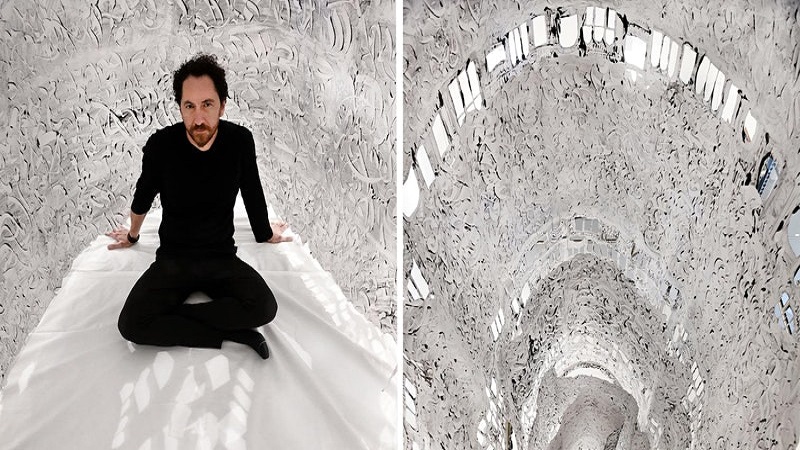The Migration of Memory: The Art of Kevork Mourad
Thu, Nov 12, 2020 4:30 PM – 5:30 PM EST
Register here.
“Mourad’s dynamic method … imbues each work with counterpoised turbulence and stagnation, movement and stasis.” – Hyperallergic
In his extraordinary practice, Syrian artist Kevork Mourad creates and projects drawings live in concert alongside musicians, such as members of the Silkroad Ensemble. His work explores a wide range of issues, including personal and cultural memory, the ways in which memory is inscribed in architectural spaces, the plight of refugees and survivors of genocide, and, perhaps most importantly, the possibility of our finding one another amid the cultural and political differences that so often divide us. Mourad’s work is thus animated by an abiding hope that, through art and artful collaboration, we can rediscover the deep history and shared humanity that binds us together.
In anticipation of the artist’s Spring 2021 Arts Transcending Borders residency where he will create an installation in the College’s Cantor Art Gallery, join us for a live conversation featuring Mourad, composer and recent collaborator Osvaldo Golijov, Loyola Professor of Music, and Meredith Fluke, Director of the Iris and B. Gerald Cantor Art Gallery. Moderated by Mark Freeman, Distinguished Professor of Ethics and Society.
Co-sponsored by Arts Transcending Borders and the Cantor Art Gallery
About the Artist:
Kevork Mourad employs his technique of live drawing and animation in concert with musicians – developing a collaboration in which art and music harmonize with one another. Collaborators include Yo-Yo Ma, Kim Kashkashian, the Los Angeles Master Chorale, Brooklyn Rider, The Knights, Perspectives Ensemble, Paola Prestini, and Kinan Azmeh and he has performed in many institutions, including The Aga Khan Museum (Toronto), The Art Institute of Chicago, The American Museum of Natural History, The Brooklyn Museum of Art, The Bronx Museum of Art, Carnegie Hall, ElbPhilharmonie (Germany), Rhode Island School of Design, Nara Museum (Japan), Lincoln Center Atrium, the Metropolitan Museum of Art and The Walt Disney Concert Hall.
Born in Qamishli, Syria, Mourad now lives and works in New York City. He received his Master of Fine Arts from the Yerevan Institute of Fine Arts in Armenia. Mourad has been a resident teaching artist at Brandeis University, Harvard University, and Holy Cross (Worcester). He is the only visual artist member in Yo-Yo Ma’s Silk Road Ensemble and is featured in the film “Music of Strangers” (2016).
Recent commissions include Israel in Egypt, for the Los Angeles Master Chorale, Sound of Stone to accompany the exhibition “Armenia!” for the Metropolitan Museum of Art and Well Wish Ya, a dance performance piece with the OYO Dance Troupe in Namibia. His performance, Home Within, co-produced with clarinetist Kinan Azmeh, has toured the world. The 2016 recipient of the Robert Bosch Stiftung Film Prize, his animated film 4 Acts for Syria made its 2019 premiere at the Stuttgart Animation Festival. He was recently asked by the Aga Khan Foundation to create a site-specific 20-foot drawing-sculpture called Seeing Through Babel, at London’s Ismaili Center, addressing the importance of diversity in our contemporary times.
About the Panelists:
Meredith Fluke is the Director of the Iris and B. Gerald Cantor Gallery at the College of the Holy Cross, where she arrived in September, 2019. Previously, she was the Kemper Curator of Academic Exhibitions and Affairs at the Davis Museum as Wellesley College, and the Program Manager for the new Center for Netherlandish Art at the Museum of Fine Arts, Boston. She has also held education and curatorial positions at the Brooklyn Museum, the Museum of Biblical Art (New York), and the Met Cloisters.
Dr. Fluke received her PhD in Medieval Art and Archaeology from Columbia University, specializing in Italian architecture of the 10th and 11th centuries. Her academic interests include the development of architectural forms and their relationship to liturgical use and the communal identity. Her study of pre-modern art and architecture and its modern reception often informs her curatorial projects, including the exhibitions: Martin Luther: Print and Protest, Fragment: A Museum’s Mid-century Legacy, and Reframing the Past: Piranesi’s Veduti di Roma. She has taught courses in Medieval Art History and Museum Studies at a number of institutions, including Fordham University, Wellesley College, and Columbia University.
Mark Freeman is Distinguished Professor of Ethics and Society and Professor of Psychology in the Department of Psychology at the College of the Holy Cross in Worcester, Massachusetts. His writings include Rewriting the Self: History, Memory, Narrative (Routledge, 1993); Finding the Muse: A Sociopsychological Inquiry into the Conditions of Artistic Creativity (Cambridge, 1994); Hindsight: The Promise and Peril of Looking Backward (Oxford, 2010); The Priority of the Other: Thinking and Living Beyond the Self (Oxford, 2014); and numerous articles and chapters on issues ranging from memory and identity to the psychology of art and religion. Winner of the 2010 Theodore R. Sarbin Award in Division 24, he also serves as editor for the Oxford University Press series “Explorations in Narrative Psychology.”
Osvaldo Golijov grew up in an Eastern European Jewish household in La Plata, Argentina. Born to a piano teacher mother and physician father, Golijov was raised surrounded by classical chamber music, Jewish liturgical and klezmer music, and the new tango of Astor Piazzolla.
Defined by The New York Times as “a musical alchemist (who) conjures up new worlds,” Golijov takes gestures and sound imagery from his own background as the points of departure for his compositions. Music from the Judeo-Christian liturgy, the Western repertory of many periods, folk traditions from around the world, and the inevitable tango and other Latin American genres, appear in his work in different stages of transformation, often metamorphosing into something else entirely or even disappearing altogether from the surface. His music is regularly performed by major ensembles in America and Europe. He is the recipient of a MacArthur Fellowship, among several other awards.
He is the Loyola Professor of Music at Holy Cross, where he has taught since 1991.
Seeing Through Babel, 2019, at the Ismaili Centre, London. Photo credit: Anne Purkiss


